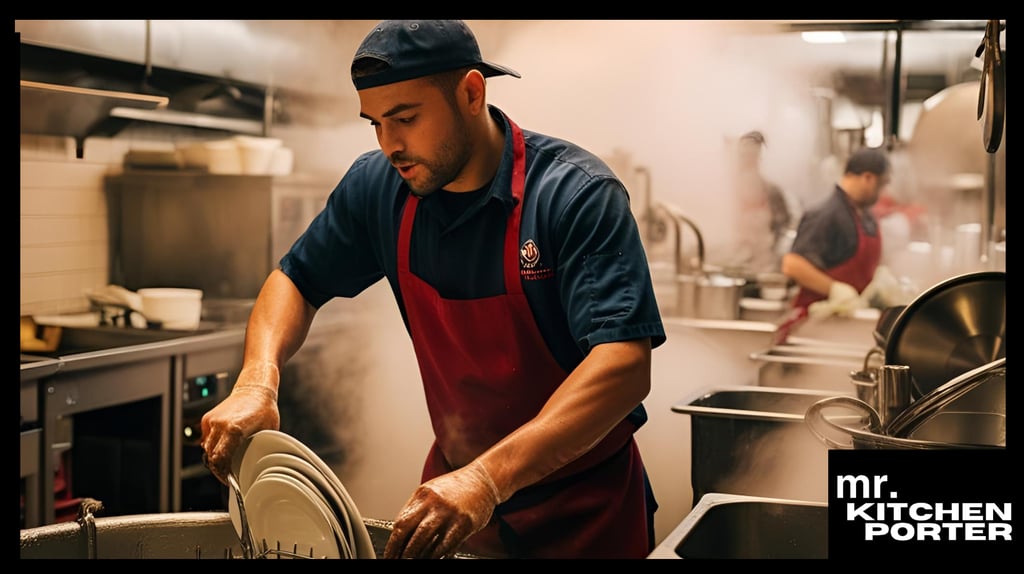The Hard Truth About Being a Kitchen Porter
A kitchen porter (KP) maintains hygiene, cleans dishes/surfaces, assists with food prep, and organizes kitchens. The role is physically demanding—long hours, heavy lifting, and fast-paced work—but offers entry into hospitality with no prior qualifications needed. Key skills include stamina, teamwork, and time management. While challenging, it provides valuable experience for those pursuing culinary careers. As critic Jay Rayner noted, "Without KPs, kitchens would collapse." Worth it for hands-on learners; too strenuous for those preferring desk jobs.
Mr Kitchen Porter
4/11/20254 min read


The Hard Truth About Being a Kitchen Porter
The Backbone of Every Great Kitchen
In case you don't know, there are heroes, heroes who wage a daily, often invisible war against chaos, grease, and exhaustion to keep commercial kitchens running.
This is not a job for the faint of heart. It is a role that demands physical endurance, mental resilience, and an almost obsessive attention to detail. But for those who can withstand the heat—both literal and metaphorical—it offers something rare in today’s job market: a no-nonsense, no-prerequisites path into the hospitality industry, with real opportunities for those willing to put in the work.
So, is being a kitchen porter worth it? And just how hard is it?
Let’s strip away the glamour and get real about what this job actually entails—the brutal challenges, the unexpected rewards, and why, for some, it becomes the most formative experience of their careers.
Who Is a Kitchen Porter?
A kitchen porter (KP) is a key staff member responsible for maintaining hygiene and cleanliness in a kitchen. Their primary duties include washing dishes, cleaning surfaces, and ensuring all equipment and areas meet health and safety standards. However, their responsibilities extend beyond these basics. To help you determine whether this job is worth pursuing and how demanding it is, we will outline and explain the most common duties of a kitchen porter.
Duties of a Kitchen Porter
Efficiency, hygiene, and organization are crucial for running a successful restaurant. A dedicated team of kitchen porters helps achieve these standards. Below are some of their core responsibilities:
1. Cleaning and Hygiene Maintenance
A kitchen porter’s primary duty is ensuring the kitchen remains clean and hygienic. This involves washing dishes, utensils, and equipment, then sanitising and drying them thoroughly. Negligence in this area can lead to severe health risks.
On a podcast, Jack Stein (son of renowned chef Rick Stein) emphasised the importance of cleanliness: "Every plate and food coming back is a story." He elaborated that customers are more likely to return if the dining experience—including clean plates and utensils—is satisfactory, regardless of food quality. Marco Pierre White, another celebrated chef, reinforced this by stating that dining is about "setting first, service second, and food third."
Additionally, kitchen porters must sweep and mop floors, clean surfaces, and maintain sinks to prevent food contamination and uphold workflow efficiency.
2. Sorting and Organising
Kitchen porters must systematically organise kitchen items. Dishes and utensils may be sorted by delicacy, frequency of use, function, or size. Food ingredients require categorisation based on:
- Storage needs (refrigeration vs. dry storage)
- Usage frequency (e.g., salt, spices)
- Type (vegetables, fruits, dairy)
- Allergen considerations (e.g., keeping gluten-free ingredients separate)
3. Food Preparation Assistance
KPs assist chefs by performing basic prep work, such as peeling, chopping, and rinsing vegetables or fruits. They may also monitor cooking progress when chefs are handling multiple dishes simultaneously.
4. Maintenance of Kitchen Equipment
Porters must ensure all kitchen equipment remains in working condition by following proper handling procedures. This includes:
- Adhering to manuals for machine operation
- Safely using hazardous cleaning chemicals
- Reporting damages and assisting with minor repairs
- Disposing of unusable items safely
These duties extend beyond mere upkeep—they ensure operational safety and efficiency.
Desired Skills and Qualities
To excel as a kitchen porter, one must possess the following attributes:
1. Physical and Mental Stamina
This is the most critical requirement. The job demands prolonged standing, heavy lifting, and work in hot, noisy, and chaotic conditions. Heat exposure can lead to dehydration, muscle fatigue, and even heatstroke. Physical fitness is essential to endure long shifts.
2. Strong Work Ethic
A hardworking attitude is invaluable, especially during peak hours. Managers and chefs appreciate porters who remain diligent without cutting corners, as this demonstrates reliability and commitment.
3. Ability to Work Under Pressure
Kitchens are high-pressure environments. Effective coping strategies include:
- Staying hydrated and eating before shifts
- Wearing comfortable, non-slip footwear
- Practicing stress management (e.g., deep breathing)
- Maintaining organisation to handle tasks efficiently
4. Positive Attitude
A proactive mindset benefits both the individual and the workplace. While some view the role as lacking career progression, those eager to learn can identify growth opportunities. Management often promotes porters who show initiative.
5. Time Management
Since kitchen porters directly impact kitchen efficiency, strong time management is crucial. It helps manage workloads, reduce stress, and improve teamwork.
Is Being a Kitchen Porter Worth It?
The answer depends on personal aspirations and preferences. Despite its challenges, many find the role rewarding. For those aspiring to open a restaurant, it offers invaluable insights into kitchen operations.
Additionally:
- No formal qualifications are required, making it accessible.
- It provides essential skills (teamwork, time management, attention to detail).
- It fosters job satisfaction, knowing you are a vital part of a team.
As restaurant critic Jay Rayner noted, "Without kitchen porters, the kitchen would collapse." He described them as "the foot soldiers in the restaurant kitchen brigade that you never see."
Is It Hard Work?
Yes—the job is physically demanding, requiring stamina for long hours, heavy lifting, and repetitive tasks in a fast-paced setting. Rayner, after working as a porter, called it "physically exhausting."
However, if you enjoy physical work and thrive under pressure, the role can be fulfilling. Conversely, if you prefer a low-stress desk job with regular hours, this may not be the right fit.
REFERENCES
1. Select Recruitment: What Is It Like to Work as a Kitchen Porter?: https://www.select.co.uk/what-is-it-like-to-work-as-a-kitchen-porter
2. Summerley Recruitment: What Is a Kitchen Porter?: https://summerleyrecruitment.co.uk/what-is-a-kitchen-porter/
3. Select Recruitment: The Hierarchy of the Professional Kitchen: https://www.select.co.uk/the-hierarchy-of-the-professional-kitchen
4. Jack Stein Podcast: https://www.youtube.com/watch?v=-xQBpuW8D_M&t=42s
5. Your Pilla: Kitchen Porter Job Description: https://yourpilla.com/blog/kitchen-porter-job-description
6. Heat Stress Guide for Workplaces: https://szu.gov.cz/wp-content/uploads/2023/07/Heat-stress-guide-guidance-workplaces_en.pdf
7. The Guardian: Jay Rayner as a Kitchen Porter: https://www.theguardian.com/lifeandstyle/2015/aug/23/can-jay-rayner-hack-life-as-a-kitchen-porter
8. The Guardian: Competitive Kitchen Cleaning: https://www.theguardian.com/food/2022/sep/15/i-used-to-cook-in-butter-smeared-chaos-now-im-a-competitive-kitchen-cleaner
WORKING HOURS
Monday - Friday 08:00 AM - 6:00 PM
Sunday - Saturday 09:00 AM - 5:00 PM
Mr. Kitchen Porter is the trading name of Elevation Support Services Limited
ADDRESS
2nd floor Berkeley Square House Mayfair W1J 6BD London
Head office: Cremer Business Centre, 37 Cremer street, E2 8HD, London UK
020 3960 5996
hello@mrkitchenporter.com
